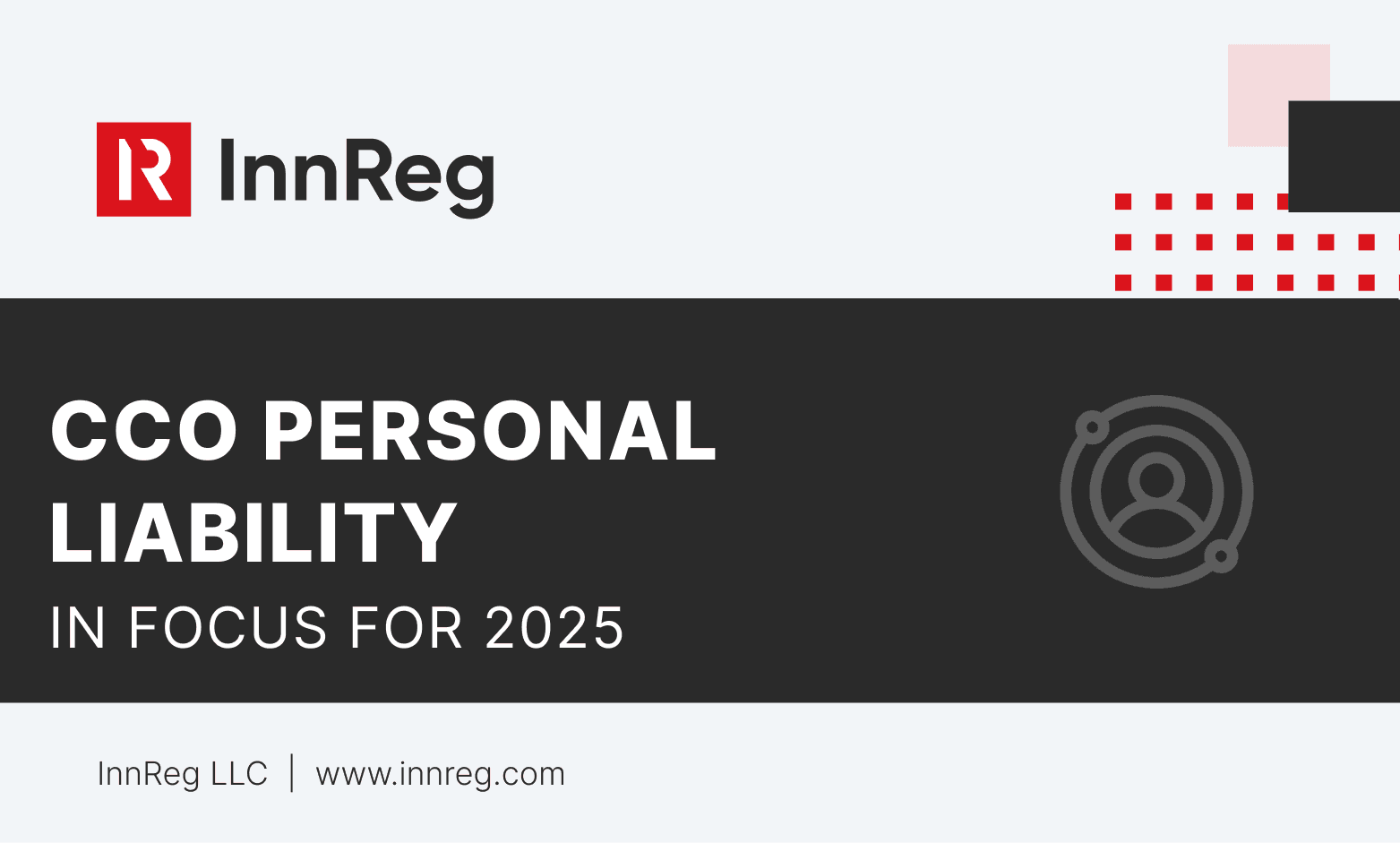
All Fintech
CCO Personal Liability in Focus for 2025: InnReg on SEC Commissioner Remarks
Jan 12, 2025
·
InnReg
·
4 min read
Contents
In a recent speech delivered at an industry event, U.S. Securities and Exchange Commission (SEC) Commissioner Mark Uyeda urged regulators to outline a framework describing scenarios where a Chief Compliance Officer (CCO) would be held liable for securities law violations made by their firm.
By way of context, it is important to remember that the SEC’s guidance on CCO liability under Rule 206(4)-7 of the Investment Advisers Act of 1940 lacks practical guidance for CCOs as it does not specify which elements investment advisers must include in their policies and procedures to meet this requirement.
In addition, the SEC has stated that CCOs can be held liable for failing to supervise compliance personnel or for making false or misleading statements to regulators.
You can read our popular comprehensive analysis of SEC Chief Compliance Officer Personal Liabilities here >>
Given the increasing complexity of the regulatory environment and the number of regulations implemented or approved by the SEC in recent years, the agency’s lack of a CCO personal liability framework has emerged as a key source of concern for compliance officers, CEOs, and other C-suite executives.
As regulators work to formalize guidance for CCOs on the scope of their responsibilities and limitations around personal liability, our fintech compliance experts at InnReg believe this is the perfect time to dig a bit deeper into the extent of individual liability for compliance officers when determining potential compliance failures.

Our compliance advisors with decades of experience present you with this analysis. It was not written by freelance copywriters, third-party agencies, or ChatGPT. InnReg works with fintech CCOs since 2013.
See also:
Understanding and Defining CCO Personal Liability
CCO personal liability refers to the legal and financial consequences CCOs may face if their firm fails to comply with applicable laws, regulations, or industry standards.
In essence, CCOs can be held liable for compliance failures in several ways, including:
Criminal liability: CCOs can be charged with criminal offenses if they are found to have participated in or facilitated unlawful activities within their organizations.
Civil liability: CCOs can be sued by employees, investors, or other stakeholders if they suffer damages due to the firm’s noncompliance. This carries the risk of fines and penalties based on regulatory enforcement actions by government agencies.
Reputation risk: Compliance failures can damage a firm’s reputation and affect the CCO’s personal and professional reputation.
Best Practices for Protecting CCOs Against Liability
Our extensive experience in compliance consulting and as an outsourced compliance provider supporting fintechs has uncovered the following key tips to help protect CCOs and keep them out of the crosshairs of regulators:
Establish a thorough compliance program: As the first order of business, CCOs should create a comprehensive compliance program to ensure compliance with laws and regulations. The program should also include a system for monitoring and reporting compliance-related issues.
Build a team for scale: CCOs should be empowered to have the staff and resources required to help them manage and implement effective compliance policies with the appropriate authority to manage and supervise the compliance program.
Conduct periodic firm risk assessments: CCOs should regularly monitor and assess their firm’s compliance risks and identify appropriate remediation strategies.
Ensure employees are well-trained: CCOs should provide employees with regular training and education on the firm’s compliance policies and procedures.
Foster a culture of compliance: CCOs should set a “tone from the top” to create a culture of compliance in all aspects of the business. This includes promoting ethical behavior, encouraging employees to speak up about compliance concerns, and ensuring the firm’s leaders are committed to compliance.
Keeping up to date with regulatory developments and emerging risks: CCOs operate in a complex and rapidly evolving regulatory environment, where laws and regulations can change quickly and without warning. It is essential for CCOs to stay informed of the latest regulatory developments and understand how they affect their organization’s compliance obligations.
Maintain constructive dialogue with regulators: CCOs should seek to maintain positive relationships with regulators, for example, by cooperating with investigations and heeding regulators’ guidance when taking corrective actions.
We cannot overstate how critical CCOs are in ensuring their firms comply with a wide range of laws and regulations cannot be overstated. However, with that responsibility comes a significant risk of violating those laws and regulations.
CCOs can be held personally liable for any compliance failure, which can lead to significant legal and financial consequences and overall reputational harm for both the firm and the CCO. To manage these risks, CCOs must follow the above best practices to help protect their firms and themselves.
Conclusion: What Does This Speech Mean for CCO Personal Liability?
We all read this SEC speech on CCO Personal Liability. We witnessed the SEC state that obligations leading to CCO personal liability are complicated and need a better definition.
Undoubtedly, there will be more debate, more interpretation, and more definition over time. In the meantime, some CCOs might end up in hot water for the rest of us to understand what regulators really consider crossing the red line.
In the meantime, do your absolute best to navigate this uncertainty: dedicate appropriate resources and talent to regulatory compliance and visibly rise above a minimalistic approach. If a regulator comes through your door, you must show the efforts, you must show results, and you must show a commitment to conduct clean business in compliance with all regulations, not just to the best of your abilities, but to meet required standards.
And this is where working with regulatory consultants like InnReg reduces your risk and gives your fintech peace of mind. Hire InnReg compliance advisory and outsourced compliance and operations support, and check off all the boxes.
More Questions About CCO Personal Liability? Ask the Experts
Need help with support and information on the responsibilities of CCOs? Reach out today for a free consultation: info@innreg.com
InnReg has extensive experience managing compliance implications of bank-fintech relationships, including the following.
Compliance policy development and management
Assistance in the banking partner selection and onboarding process
Risk assessment and quality control
Implementation of compliance management workflows (e.g., user onboarding, suspicious activity monitoring, advertising compliance)
Support the CCO function and other key stakeholders in establishing an effective compliance governance and risk management framework.
Compliance facilitation across Federal and State regulatory bodies
Monitoring for regulatory changes
How Can InnReg Help?
InnReg is a global regulatory compliance and operations consulting team serving financial services companies since 2013.
We are especially effective at launching and scaling fintechs with innovative compliance strategies and delivering cost-effective managed services, assisted by proprietary regtech solutions.
If you need help with compliance, reach out to our regulatory experts today:
Published on Dec 5, 2023
Last updated on Jan 12, 2025
Related Articles

All Fintech
Feb 12, 2025
·
11 min read

All Fintech
Dec 26, 2024
·
18 min read

All Fintech
Dec 11, 2024
·
8 min read
Latest LinkedIn Posts












